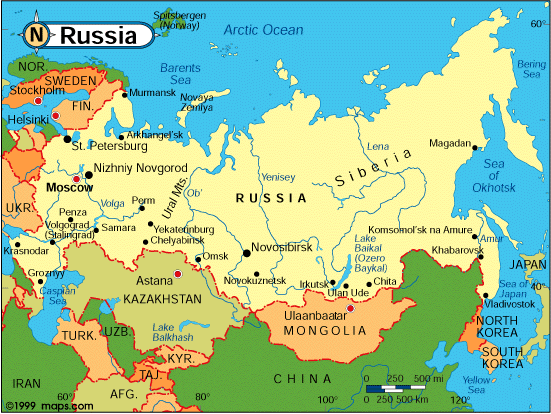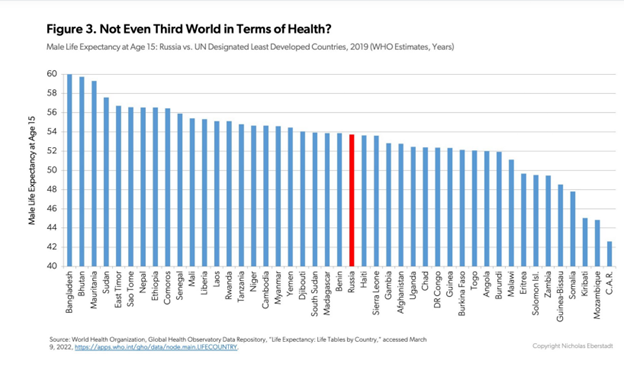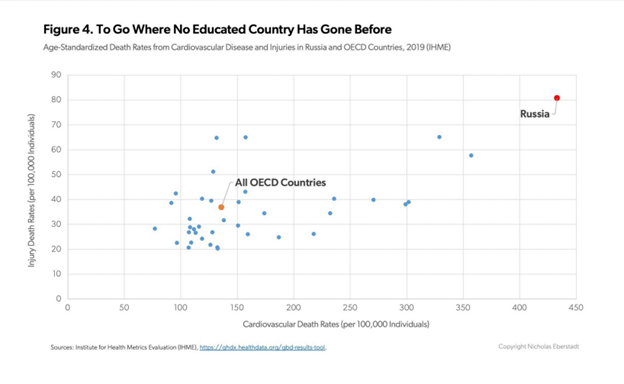Poor Mother Russia
No one much needs to be convinced that Vladimir Putin runs Russia like a more-corrupt version of a 19th-century czar. Even DJT knows that, it is possibly why he seems to admire Vlad so much. Domestically corrupt, and internationally dangerous, that sort of sums Putin up, particularly since his incursions into Ukraine.

It’s a really big country, eh?
That Putin is popular among Russians has been said and written by many. According to Russia’s Levada Center, an independent research organization based in Moscow, his approval rating stood at 83% in a poll they did in December of 2023.
Now this is Russia, so one has to ask: how ‘independent’ is this Levada, really, and even if it is, how free do you believe Russians feel to answer truthfully in such a poll? Still, according to a report in US News in December of 2024, NORC, a very reputable opinion survey organization based at The University of Chicago, did a poll in Russia that found (as quoted in US News):
Nearly two-thirds (65%) of respondents indicated they would support a Putin bid for a fifth presidential term in the country’s March election – a share that includes 53% who said they would “strongly” approve of his nomination. Sixty-six percent also said they were more likely to vote for Putin over another candidate.
Not 83%, obviously, but still pretty damn high.
There is a standard story about authoritarian governments – and perhaps also less-authoritarian ones – that they exaggerate, if not invent, outside threats as a way to engender support in a population for which the domestic situation is miserable. The Nazis in the early 30s, notably, played up the threat from Jews and France and Russia as a way to gain support when things were going very badly for the German people. I don’t mean that to be a complete analysis of the rise of Nazism in Germany. It was a complex mess, but it fits this standard story.
So we can ask if something like that is behind Putin’s second war on Ukraine. Is he trying to keep his people’s eyes off the fact that their lives are pretty miserable under his kleptocracy?
It’s a tempting idea, but doesn’t stand up well if we look at the most obvious statistic, Russia’s GDP per capita. That tells us how much Putin’s Russian economy is able to generate in income per Russian. If that is low, it is bad for said Russians, and a reason for Putin to find a distraction: like Ukraine as a ‘war against Western aggression’.
But here’s the thing. Using data from The World Bank, Worldometer says that Russia’s GDP per capita, in common US purchasing power parity dollars, was $44,120 in 2023. That ranks it 47th out of 181 countries, and in the same ball park as other Eastern European countries like Slovakia and Poland. It is hardly in the US/UK/Canada etc first-world class, but well ahead of Ukraine at 95th, and even China, at 75th.
It is clearly in the 2nd-world class, at least, and that does not seem like something that needs distracting from. China hasn’t felt the need to invade another country…..at least, not yet.
But here is what got me thinking about this. I found myself at a site called The American Enterprise, reading an article about the health of the Russian population. It was eye-opening. It starts with the observation that the average years of education in the Russian population is just over 12.5 years. More importantly, that is almost exactly the average for all OECD countries. The OECD, if you did not know, is the ‘club’ of all the rich countries in the world – the first world, for sure.
So, again, Russia seems to be doing rather well.
Then they dive into health statistics for the Russian population, and things no longer look so good.
Here’s Figure 3 from the AE article. It shows Russian life expectancy at age 15 (in red) relative to a bunch of very-much-3rd-world countries:

To be fair, Russians’ life expectancy at age 15 is better than for many African countries, but it is well below that of Bangladesh, Sudan and Ethiopia. A Russian who makes it to age 15 can expect to live to the age of 54, on average. That is not first world. In the US it is 80years and in Canada 83.
The next Figure tells one a lot about why this is true. It depicts the death rates from two causes: cardiovascular disease and ‘injuries’. The data for these two causes is given below for Russia (in red) and all OECD countries (in blue).

Injuries, by the way, refers to deaths by homicide, suicide, poisoning and accidents. Russia has the worst death-rates in both categories relative to all OECD countries. By a big margin. The graph indicates the Russan death rate for CVD is some three times the OECD average and that for injuries more than twice the OECD average. Jeez.
The AE piece goes on to show that Russia does badly relative to the rest of the world also in patenting and patent applications, despite its high level of education. I suspect that in a society in which the legal system is widely viewed as corrupt, there is little incentive to file for a patent – but that is just my guess. There are many highly-educated Russian ex-pats, one was a colleague of mine back in the day. A very bright fellow. I wonder what the patenting rate for Russian ex-pats is like.
Anyway, I am generally of the view that GDP/capita, although far from meaningless, cannot give us a full picture of the situation for people in any country. These health statistics do at least suggest to me that the Russian population might in fact need to be distracted by their leader from the relative grimness of their lives. That is certainly not the whole explanation for Putin’s Ukraine adventure, but it might be part.